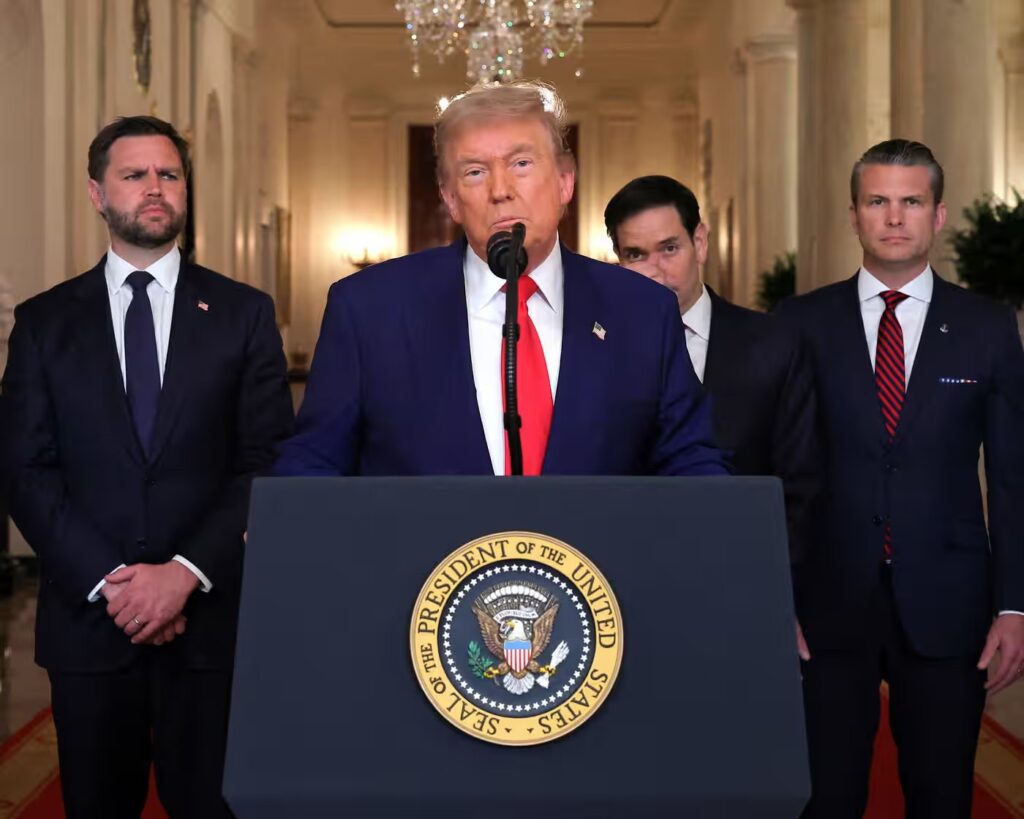
Ah yes, another brilliant strategic masterstroke from the land of the free and the home of the eternally bewildered.
So the US has bombed Iran’s nuclear processing sites—because nothing says “carefully considered foreign policy” quite like lobbing explosives at a problem and hoping it magically resolves itself.
Bravo, Mr President. What’s the encore? Are we dusting off that vintage CIA playbook again, the one with the piss-stained pages and the track record that makes the Hindenburg look like a success story? If so, buckle up for another thrilling decades-long adventure where we’ll eventually decide this was all a colossal mistake. Then comes the inevitable face-saving withdrawal, leaving our handpicked puppet in Tehran hung out to dry when the whole house of cards collapses.
There’s something almost poetic about modern warfare’s cruel irony if you enjoy poetry that rhymes “overwhelming firepower” with “strategic incompetence”. The same military machine that can flatten cities with surgical precision becomes mysteriously impotent when faced with the apparently impossible question: “So… how exactly do we leave?”
We’re viewing this melodrama in real time, watching nations armed with the most sophisticated killing machines in history stumble into conflicts with all the strategic foresight of a drunk tourist walking into traffic. The pattern is as predictable as it is pathetic—shock and awe followed by decades of expensive confusion as the original mission transforms into something that would make Kafka weep.
Afghanistan’s ghost is practically taking up residence in every war room these days. Twenty years, several trillion dollars that could have bought every American a Tesla, countless lives sacrificed, and what was accomplished? A Taliban stronger than when our flag-waving, freedom-dispensing cowboys first rode into town.
Iraq offers an equally heartwarming sequel—remember those “Mission Accomplished” banners? They’ve aged like milk in the desert sun, giving way to sectarian violence and regional chaos that continues spreading like geopolitical herpes. Yet here we are again, watching powerful nations charge headfirst into conflicts without sketching even the most rudimentary outline of what victory might look like—apparently assuming “we’ll figure it out as we go” is a legitimate military strategy. It’s political malpractice on a scale that would make even Machiavelli question his career choices.
The absence of an exit strategy isn’t just poor planning—it’s a masterclass in transforming limited objectives into bottomless money pits that devour resources, lives, and credibility with the efficiency of a bureaucratic black hole. When suit-wearing sociopaths can’t articulate what they’re fighting for beyond vague platitudes about “security”, the goalposts become as stable as a house of cards in a hurricane.
Reflect on the cynical incentives at play. For politicians, “forever war” is remarkably useful: it rallies the base, justifies grabbing power, and distracts from irksome domestic problems like crumbling infrastructure and healthcare that makes extortion seem like a reasonable business model.
The costs are borne by others—soldiers who enlisted to serve their country but end up babysitting failed states, civilians who discover their wedding celebrations make excellent target practice, and taxpayers funding this machinery of violence while their own public services disintegrate. Meanwhile, benefits flow to those titans of incompetence who never have to explain to a mother why her child became cannon fodder for missions that morph faster than a politician’s conscience.
This isn’t just poor military strategy—it’s a fundamental betrayal of democratic leadership. If we send young people into battle, the least we can do is provide them with a viable plan for victory and a credible path home. Without that, we’re not waging war—we’re running an expensive abattoir.
The international community deserves special mention for their stunning ability to stand around wringing their hands while doing nothing. When the big boys play with their expensive toys, the ripple effects are spectacular: refugee crises, extremist groups exploiting chaos with the enthusiasm of bargain hunters at a clearance sale, and proxy conflicts with more sequels than Mission Impossible.
The Middle East stands as a glorious testament to what happens when military interventions are planned with all the prudence of a toddler with dynamite.
History is screaming warnings, but apparently we’ve all gone conveniently deaf. Wars without exit strategies don’t just fail—they actively sabotage their own objectives with the precision of a professional wrecking crew. Vietnam, Iraq, Afghanistan—each time, chickenhawks pledged this conflict would be different, that overwhelming force would somehow produce real political solutions that had eluded strategists for decades. It’s like watching someone play Russian roulette while arguing the odds improve with practice.
Perhaps it’s time for a revolutionary concept: thinking before shooting. The real work of building enduring peace involves diplomacy, reconstruction, and political settlements that address root causes—all that boring stuff that doesn’t make for good photo ops.
We desperately need leaders brave enough to ask radical questions before committing to war: What does victory look like? How will we know we’ve achieved it? What happens to the defeated? These aren’t abstract musings—they’re basic requirements for any intervention that hopes to achieve something beyond providing Netflix with endless content about spectacular military failures.
The world can’t afford another generation of “forever” wars. We have actual existential threats to worry about—climate change, pandemics, democratic collapse—but apparently those require the kind of long-term thinking that gives politicians migraines.
Starting a war may be a crisis decision, but ending one requires cold, analytical thinking that seems extinct in political circles. Until we demand better—until we insist our decision-making specimens show us the exit before asking us to enter—we’ll continue stumbling from one endless conflict to the next, each time solemnly promising ourselves that this time will be different while trying to keep a straight face